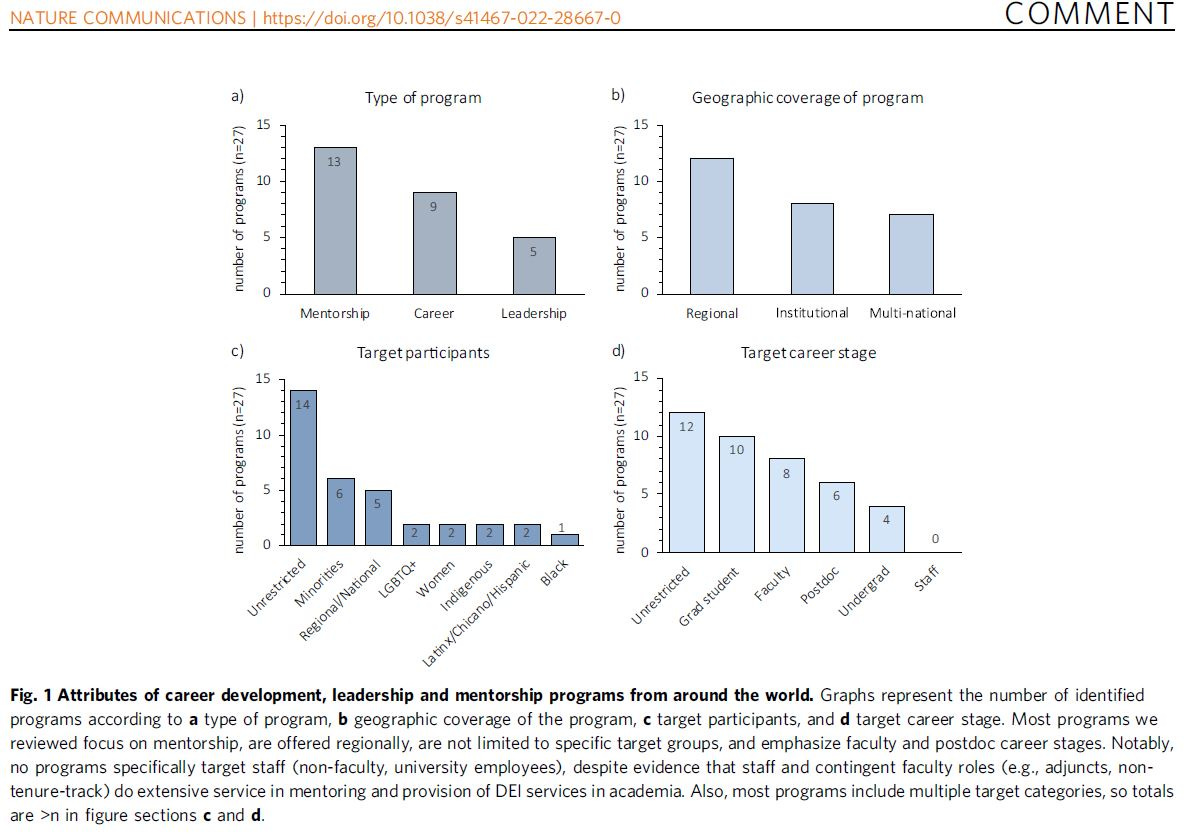Community voices – the importance of diverse networks in academic mentoring
Rebooting an article that feels especially relevant
Per School of Good Trouble summer traditions, I’m running some evergreen posts highlighting past work/ideas/tools that more recent readers may not have seen when I first published them. Today’s post is a lightly edited reboot of a paper I co-authored with an international group of folks interested in understanding what kinds of mentoring actually helps.
A few years ago, I started collaborating with an international group of researchers interested in enhancing mentoring for scientists within academic settings. After a couple of years, we published a paper that details one of the essential approaches that we identified through a scan of 27 career development, leadership, and mentoring programs worldwide. That is: rather than relying exclusively on an individual mentor (often an adviser or supervisor), mentoring is most impactful when people are connected to mentor networks.
Specifically, people benefit from multiple mentors1 who are located in distinct and varied roles, institutions, and career stages.
We recommend this structure be invested in and developed across training stages, to better support of scientists as they progress through their careers.
As I noted in the press release that my university issued about the paper:
“A boss or adviser is not automatically a mentor,” Garramon Merkle clarifies. Rather, mentors are people who commit to the professional growth of their mentee, regardless of whether this benefits the mentor.”
The authors note this mindset can be challenging, as mentors may not have the same life experiences, goals or professional requirements as their mentees. For example, most UW students will not become academics or even teachers.
“We have a huge responsibility: Advisers and instructors should be able to teach and advise students toward the careers and civic lives they desire,” Garramon Merkle says. “We can do this if we help each other.”

The perspectives in this paper were especially relevant for my institution, as I was part of the team leading our necessary, cyclical processes of updating our strategic plan while other friends of mine led a total update of our general education programs.
As I see it, when we are doing such significant planning and management work in an institution, we have the opportunity (and I would say responsibility) to embed effective mentorship methods across campus. We can do that by building on approaches that are demonstrated to work and meet long-standing needs in career development and support, many of which my co-authors and I cite in our mentorship paper.
And if you think that this sort of work can only be impactful if it is implemented campus-wide and has support from institutional leadership, I’ll also point you to related work of mine that shows how valuable positive change can be achieved at the departmental, program, and even individual levels.
For example, in the press release about this paper, I highlighed my institution’s Learning Actively Mentoring Program (LAMP), which is a flagship program in our Top-Tier Science Programs and Facilities Initiative. LAMP connects a cohort of university and community college faculty and graduate students to a team of mentors for an entire year. The resulting long-term relationships are more feasible because mentoring is shared across the team. This, in turn, leads to a diverse group of people trained in teaching that is more effective.
I was especially delighted to be part of this team because of the wide-ranging nature of my co-authors’ perspectives. They come from institutions in Argentina, Brazil, Canada, Chile, China, Ecuador, the Netherlands, the United Kingdom and the U.S.
For more about the paper, you can see the full press release here, read the paper here, or contact me for a copy of the paper if you can’t access it due to a paywall.
How about you?
What kinds of mentoring have you had access to and what aspects of it were helpful? What additional/external types of mentorship have you needed in your career?
*Updated to correct citation 8/5/2025, 10:20 am*
Full citation: Deanna, R., B.G. Merkle, I. Baxter, K.P. Chun, R. Zuo, L.M. Diele-Viegas, P. Geesink, V. Aschero, D. Navarro-Rosenblatt, A. Bortolus, P.A. Ribone, E. Welchen, M.J. de Leone, S. Oliferuk, N.H. Oleas, M. Grossi, A. Cosacov, S. Knapp, A. López-Mendez, G.A. Auge. 2022. Community voices: The importance of diverse networks in academic mentorship. Nature Communication 13, 1681: 1-7. https://doi.org/10.1038/s41467-022-28667-0. If you hit a paywall at that link, contact me – I’m happy to email you a copy of the full article.
This insight relates to a conundrum that my collaborator, Dr. Virginia Schutte and I, have discussed at length on our podcast: Meteor-The (Overly) Honest Podcast about Scicomm with Impact. That is, there are stages in our careers where we very much needed mentorship. And, we are now at points where we are rethinking what mentorship is, what we need, and whether a “mentor” in the typical sense is even what would be helpful. The multiple-mentor/mentoring network insights from the paper I’m sharing today add useful context to our search for meaningful, professional support at our current career stages.





